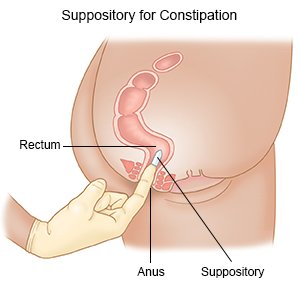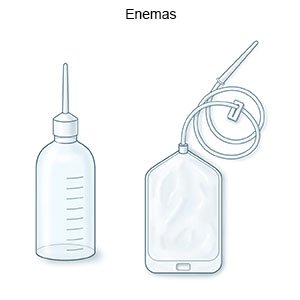Obstipation
Medically reviewed by Drugs.com. Last updated on Aug 4, 2025.
Obstipation develops when you become so constipated you cannot have a bowel movement. You may feel like you need to have a bowel movement. You may have abdominal or rectal pain. You may also have bloating, nausea, or vomiting.
DISCHARGE INSTRUCTIONS:
Return to the emergency department if:
- You have severe abdominal pain.
- You have a bloody or black bowel movement.
Contact your healthcare provider if:
- You vomit more than once.
- You have a fever and back, stomach, muscle, or joint pain.
- You are losing weight without trying.
- You have a change in the color, amount, size, or consistency of your bowel movements.
- You have questions or concerns about your condition or care.
Medicines:
- Medicines such as a laxative may help relax and loosen your intestines to help you have a bowel movement. Your provider may recommend you only use laxatives for a short time. Long-term use may make your bowels dependent on the medicine.
- Take your medicine as directed. Contact your healthcare provider if you think your medicine is not helping or if you have side effects. Tell your provider if you are allergic to any medicine. Keep a list of the medicines, vitamins, and herbs you take. Include the amounts, and when and why you take them. Bring the list or the pill bottles to follow-up visits. Carry your medicine list with you in case of an emergency.
Follow up with your healthcare provider as directed:
Your healthcare provider may refer you to a gastroenterologist. Bring a list of your questions so you remember to ask them during your visits.
Relieve obstipation:
- A suppository may be used to help soften your bowel movements. This may make them easier to pass. A suppository is guided into your rectum through your anus.

- An enema is liquid medicine used to clear bowel movement from your rectum. The medicine is put into your rectum through your anus.

Treatment options
The following list of medications are related to or used in the treatment of this condition.
Prevent obstipation:
- Drink liquids as directed. Liquids will help keep your bowel movements soft so you pass them with less pain. Ask your healthcare provider how much liquid to drink each day and which liquids are best for you.
- Eat high-fiber foods or take fiber supplements. Fiber adds bulk to your bowel movement and makes it easier to pass. Raw fruits, fresh vegetables, whole grains, and beans are examples of high-fiber foods. Adults should eat at least 20 grams of fiber a day. Your healthcare provider or dietitian can help you plan meals.

- Make time for your bowel movements. You may develop constipation if you ignore the urge or wait too long. Help train your body to have regular bowel movements by setting a bathroom time each day. The best time is after a morning meal, because your colon prepares for a bowel movement when you eat.
- Exercise regularly. Exercise may help your intestines pass bowel movements more often. Ask your healthcare provider about the best exercise plan for you.

© Copyright Merative 2025 Information is for End User's use only and may not be sold, redistributed or otherwise used for commercial purposes.
The above information is an educational aid only. It is not intended as medical advice for individual conditions or treatments. Talk to your doctor, nurse or pharmacist before following any medical regimen to see if it is safe and effective for you.
Learn more about Obstipation
Treatment options
Care guides
Medicine.com guides (external)
Further information
Always consult your healthcare provider to ensure the information displayed on this page applies to your personal circumstances.
